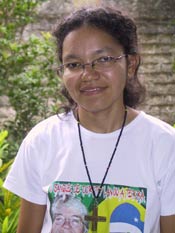
Luke 23:1-49
The elders of the people, chief priests and scribes, arose and brought Jesus before Pilate. They brought charges against him, saying, “We found this man misleading our people; he opposes the payment of taxes to Caesar and maintains that he is the Christ, a king.” Pilate asked him, “Are you the king of the Jews?” He said to him in reply, “You say so.” Pilate then addressed the chief priests and the crowds, “I find this man not guilty.” But they were adamant and said, “He is inciting the people with his teaching throughout all Judea, from Galilee where he began even to here.”
On hearing this Pilate asked if the man was a Galilean; and upon learning that he was under Herod’s jurisdiction, he sent him to Herod who was in Jerusalem at that time. Herod was very glad to see Jesus; he had been wanting to see him for a long time, for he had heard about him and had been hoping to see him perform some sign. He questioned him at length, but he gave him no answer. The chief priests and scribes, meanwhile, stood by accusing him harshly. Herod and his soldiers treated him contemptuously and mocked him, and after clothing him in resplendent garb, he sent him back to Pilate. Herod and Pilate became friends that very day, even though they had been enemies formerly. Pilate then summoned the chief priests, the rulers, and the people and said to them, “You brought this man to me and accused him of inciting the people to revolt. I have conducted my investigation in your presence and have not found this man guilty of the charges you have brought against him, nor did Herod, for he sent him back to us. So no capital crime has been committed by him. Therefore I shall have him flogged and then release him.”
But all together they shouted out, “Away with this man! Release Barabbas to us.” — Now Barabbas had been imprisoned for a rebellion that had taken place in the city and for murder. —Again Pilate addressed them, still wishing to release Jesus, but they continued their shouting, “Crucify him! Crucify him!” Pilate addressed them a third time, “What evil has this man done? I found him guilty of no capital crime. Therefore I shall have him flogged and then release him.” With loud shouts, however, they persisted in calling for his crucifixion, and their voices prevailed. The verdict of Pilate was that their demand should be granted. So he released the man who had been imprisoned for rebellion and murder, for whom they asked, and he handed Jesus over to them to deal with as they wished.
As they led him away they took hold of a certain Simon, a Cyrenian, who was coming in from the country; and after laying the cross on him, they made him carry it behind Jesus.
A large crowd of people followed Jesus, including many women who mourned and lamented him. Jesus turned to them and said, “Daughters of Jerusalem, do not weep for me; weep instead for yourselves and for your children for indeed, the days are coming when people will say, ‘Blessed are the barren, the wombs that never bore and the breasts that never nursed.’ At that time people will say to the mountains, ‘Fall upon us!’ and to the hills, ‘Cover us!’ for if these things are done when the wood is green what will happen when it is dry?” Now two others, both criminals, were led away with him to be executed.
When they came to the place called the Skull, they crucified him and the criminals there, one on his right, the other on his left. Then Jesus said, “Father, forgive them, they know not what they do.” They divided his garments by casting lots. The people stood by and watched; the rulers, meanwhile, sneered at him and said, “He saved others, let him save himself if he is the chosen one, the Christ of God.” Even the soldiers jeered at him. As they approached to offer him wine they called out, “If you are King of the Jews, save yourself.” Above him there was an inscription that read, “This is the King of the Jews.”
Now one of the criminals hanging there reviled Jesus, saying, “Are you not the Christ? Save yourself and us.” The other, however, rebuking him, said in reply, “Have you no fear of God, for you are subject to the same condemnation? And indeed, we have been condemned justly, for the sentence we received corresponds to our crimes, but this man has done nothing criminal.” Then he said, “Jesus, remember me when you come into your kingdom.” He replied to him, “Amen, I say to you, today you will be with me in Paradise.”
It was now about noon and darkness came over the whole land until three in the afternoon because of an eclipse of the sun. Then the veil of the temple was torn down the middle. Jesus cried out in a loud voice, “Father, into your hands I commend my spirit”; and when he had said this he breathed his last.
The centurion who witnessed what had happened glorified God and said, “This man was innocent beyond doubt.” When all the people who had gathered for this spectacle saw what had happened, they returned home beating their breasts; but all his acquaintances stood at a distance, including the women who had followed him from Galilee and saw these events.
The Gospel of the Lord
Gospel Reflection
Sunday, April 14, 2019
by Sandra Araújo dos Santos, SNDdeN
Palm Sunday closes a cycle of a journey to the desert, our inner desert. Now, we are ready to walk with Jesus towards resurrection. However, there is a problem: the gospel of the day begins with a great lie.
“We have found this man subverting our nation. He opposes payment of taxes to Caesar and claims to be Messiah, a king.”
As we look into our reality today, we continue facing this kind of challenge. There are so many lies circling in our midst and deciding the future of nations, peoples and so forth. We live in a time of fake news. And this “fake news” incites violence among peoples, nations, relatives, religions.
Jesus was condemned, crucified and assassinated based on fake news that only helped those in power to continue in their positions, exploiting the daughters and sons of God. The paradox is on the next sentence we can envision a truth. Jesus’s teaching, in fact, opened the eyes of many, and they became dangerous to the system.
Let us look to the next sentence from today’s gospel: “He stirs up the people all over Judea by his teaching. He started in Galilee and has come all the way here.” Jesus is also accused of raising consciousness and so, people would be able to see clearer and question the imposed sufferings and unjust systems, and this, was a problem for those in power.
This is also a concrete reality on our world of today. We can see so many women and men being accused unjustly and even killed because their teaching “stirs up people”. We can give one example from Brazil, last year Padre Amaro, a priest and leader of the Land Pastoral, who ministers with our sisters in Anapu where Sister Dorothy was killed, was arrested, and is suffering a criminal process in court based on a great lie and also a truth, which is that his teaching, his presence, his ministry “stirs up people”.
The next sentence of today’s gospel also speaks to our times: “Then Herod and his soldiers ridiculed and mocked him. Dressing him in an elegant robe, they sent him back to Pilate”. The results of this whole bunch of fake things spreads over the entire world of today, is that the Christians, the so called people of God, spread out, get hurt and confused, whereas the ones who plant the discord get united and become friends again.
This was what happened on that day with Jesus’s accusers and judges. “That day Herod and Pilate became friends—before this they had been enemies”. Finally Simon of Cyrene: “…they seized Simon from Cyrene, who was on his way in from the country, and put the cross on him and made him carry it behind Jesus”.
This continues to be our call for today. To carry the crosses that are crushing the poor, the migrant, the young who do not know what to do with their lives, so commit suicide. The Cross carried by indigenous people who have their lands destroyed by the agribusiness. The Cross carried by the afro peoples suffering racism all over the world. The Cross that is supported by women who are killed by the patriarchal system throughout the world.
Let us begin this Holy Week being spiritually strong, after our journey to the desert, to help all of these sons and daughters of God get free from all those crosses imposed to them. Let us be resurrection to God’s people as Jesus is to all of us.
 Meet Sandra Araújo dos Santos, SNDdeN
Meet Sandra Araújo dos Santos, SNDdeN
Sister Sandra Araújo dos Santos was born on March 23, 1977 in the State of Maranhão, Brazil. Her parents are farmers and for this reason, looking for land, they migrated to the State of Pará. In Maranhão, it is too hard to get land.
In Anapu, Pará, Sandra got to know the Sisters of Notre Dame de Namur. The first Notre Dame Sister that she met was Sr. Dorothy Stang. This happened as soon as her family arrived in Anapu. Then, as Sandra grew up, she participated in the events held by the Sisters of Notre Dame. In 1995, she began to live with the Sisters and became a postulant in 1997. She made her perpetual Vows as an SND in January 2008.
Now, Sr. Sandra lives in São Luis in an SNDdeN community with Sisters Anne Wihbey, Maria de Jesus Borges Costa and Maria Vagner Souza Silva. She dreams of a world where all God’s children will be able to live with dignity.
